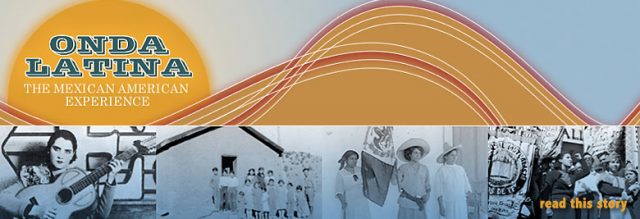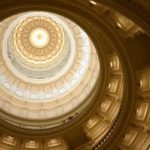by John McKiernan-González
We learn to listen before we learn to read and we speak long before we learn to write. Most archives, however, are built to store printed pages, maps, personal letters, diaries, logbooks, notebooks, and manuscripts. We sometimes claim that these texts allow us to hear the voices of the past, but radio recordings let us to hear the tenor of those conversations.
With the advent of radio in the 1920s, people found a medium that bridged the spoken word and the printed page, household and community. With the purchase of a radio and the turn of a dial, people could hear worlds far beyond their immediate neighborhood. In the 1930s, radio became part of the political landscape. The intimacy of radio listening made presidential addresses fireside chats. Local radio hosts and producers added these broadcasts to a wildly diverse radio landscape, a landscape that reflected the general ethnic orientations in a given city. In 1930s Los Angeles, for example, Pedro Gonzalez of KPMC radio, kept his listeners abreast of developments in news and music in Mexican America. Radio provided a powerful way to connect musicians to their audiences, a situation that allowed Pedro Gonzalez’ recording career to blossom even further. Listeners participated in this Mexican American community without having to purchase, subscribe to or even read a paper. We know this because his recordings on vinyl are available, the local English and Spanish-Language news reported on his celebrity comings and goings, and the Los Angeles Mexican community challenged his deportation in the 1930s. We can read about Pedro Gonzalez, we just cannot hear what he had to say.
The radio program we have here is from a very different moment in Chicano community radio: the end of the 70s. The Mexican American Experience was the first nationally distributed Latino-themed public radio show, the direct precursor to the award winning Latino USA. The Mexican American Experience was produced by the Longhorn Radio Network (LRN), a public service minority content factory located deep in the basement of the Communications building.* The LRN had a particular market niche. Federal guidelines required every radio station to have a set number of broadcast hours dedicated to minority content, and the LRN produced radio shows with public service and minority content for radio stations across Texas and the Southwest. The Mexican American Experience was one of these shows but is also the only Longhorn Radio Network radio show available to anyone with access to the web. The show’s hosts – Alejandro Saenz, Richard Goodman, Andres Tijerina, Gloria Contreras, John Wheat, Armando Gutierrez and Rosa Linda Fregoso — touched on leading issues facing Chicano communities in Texas and the rest of the United States. The show also provided a public forum for the first substantial generation of Latino faculty and graduate students at the University of Texas at Austin.
The recording we have here – “Educating Undocumented Children” – was broadcast on KUT (Austin) just before the Supreme Court decided Plyler v. Doe, which in 1982 established that undocumented children had constitutional rights to education in the United States under the equal protection clause. This 5-4 decision also implied school districts had the responsibility to educate every child in their district. Previously, in 1975, the state legislature had passed Texas Education Code 21031, which gave school districts the authority to charge tuition for or exclude undocumented students from school. Parents immediately challenged the constitutionality of the ruling and a variety of cases from Austin, Tyler and Houston started bubbling up into the federal district courts. In the summer of 1981, Austin Independent School District decided once again to prohibit the attendance of undocumented students. In the fall of 1981, school principals across Austin started to prevent children from attending school.
Rosa Linda Fregoso decided to feature key players in this situation on her radio show. Mark White, the attorney general for the State of Texas; Peter Shay, the lead attorney for the ACLU, Mr. Lopez, a local parent and Nestor Rodriguez, all agreed to be recorded for the show. Peter Shay focused on the constitutional shakiness behind the argument that some people in this country should have less access than others to equal protection under the law. Mark White emphasized the ways the funding streams for federal and the state government did not benefit Texas equally. Mr. Lopez pointed out that he paid sales tax, property tax and income tax, but his children did not receive any benefit from his labor or his taxes. Nestor Rodriguez discussed the impact of the court decision on children in East Austin. He chatted about the alternative school for undocumented children he established on the grounds of the Our Lady of Guadalupe church. Linda Fregoso moved across these very different political realms and- through editing – placed two East Austin residents in direct conversation with national debates over the constitutional importance of schooling. By listening, the debate seems less abstract, and – since no Supreme Court decision had yet been written or heard – the question regarding education and the bill of rights was still open.
This program captured history in the making, a history that we still all share. Radio may be a way to get people to exercise their historical imagination, to listen for differences between then and now, even though then was only 30 years ago.
LISTEN HERE: http://www.laits.utexas.edu/onda_latina/program?sernum=MAE_81_46_mp3&term=plyler
*Audio files of 226 broadcasts of “The Mexican American Experience,” produced by The Longhorn Radio Network are available at Onda Latina thanks to the College of Liberal Arts, the Nettie Lee Benson Library, the Center for Mexican American Studies, the Department of History, FASTEX, and the Liberal Arts Instructional Technology Service; all of The University of Texas at Austin.
Sources and More:
Susan Douglas, Listening In: Radio and the American Imagination (2009)
Melvin Patrick Ely, The Adventures of Amos and Andy: The Social History of an American Phenomenon (2001)
Ari Kelman, Station Identification: a Cultural History of Yiddish Radio (2009)
David Montejano, Quixote’s Soldiers: A Local History of the Chicano Movement, 1966-1981 (2010)
Alexander Russo, Points on the Dial: Golden Age Radio beyond the Networks (2010)
George Sanchez, Becoming Mexican American: Ethnicity, Culture and Identity in Chicano Los Angeles, 1900-1945 (1994)
Richard Valencia, Chicano Students and the Courts: The Mexican American Legal Struggle for Educational Equality (2009)



